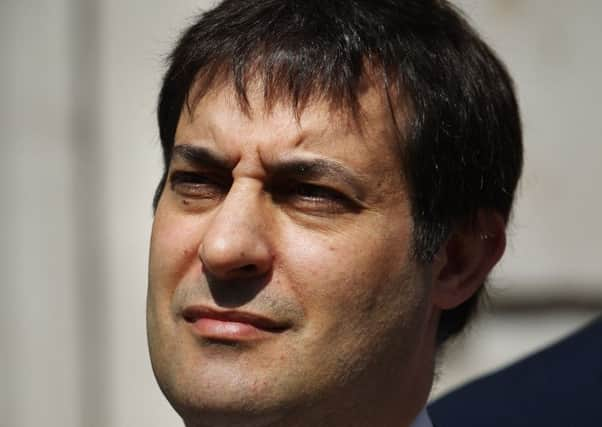Euan McColm: Privacy's champion deserves public humiliation


Despite John Whittingdale being Culture Secretary, sub-editors would have crowbarred into the front-page headline a reference to whips; a two-page spread inside would have been illustrated by a Photoshopped image of the MP’s head on a rubber suit clad body. Somewhere the word “gimp” would have appeared. It would have been typeset thus: “giMP”.
Before running the story, the editor and the news desk team would have paid attention to matters of public interest. The facts of the story would be straightforward: a member of the cabinet had had a relationship with a sex worker. But that, in itself, did not justify publication.
Advertisement
Hide AdAdvertisement
Hide AdAnd so the editor would have asked if there was evidence of hypocrisy. Had Whittingdale, perhaps, been outspoken about the sex industry? If he had condemned prostitution then he’d have been a hypocrite and if he had been supportive of sex workers’ rights then he’d have been compromised.
When reporters failed to uncover evidence of hypocrisy, the editor would have deployed one of journalism’s cheapest little tricks. The story would have been declared to be in the public interest because should anyone find out about the relationship, Whittingdale would be vulnerable to those who might wish to exert undue influence over him.
The hypothetical vulnerability of powerful people was long used to justify the publication of news stories that were entirely prurient.
If the circumstances surrounding a particular private relationship did not build a public interest defence then the very thing itself would become proof of its newsworthiness. It was a nonsense. I have been in enough news conferences to know that editors have never seriously believed that a minister whose secrets they expose is at risk of blackmail.
But a juicy story was a juicy story and the justification could always be created.
And then something important happened. Max Mosley, the former head of the governing body of Formula One, hit back when the News Of The World published details of his encounters with prostitutes.
Mosley defeated the newspaper in court, which was forced to pay him damages over the false suggestion that the orgy in which he’d participated had a Nazi theme. Mosley’s victory terrified tabloid editors. He had shown that papers couldn’t simply get away with invading privacy on the weakest of public interest grounds.
And, after Mosley, came the phone hacking scandal that closed the News Of The World and transformed the way all newspaper editors – tabloid and quality alike – go about their business.
Advertisement
Hide AdAdvertisement
Hide AdA younger generation of tabloid editors were, by and large, fairly comfortable about the new rules of engagement. The sordid kiss-and-tell wasn’t real journalism and its passing was not widely mourned.
So, it’s entirely plausible that a number of newspapers looked at the story of Whittingdale’s historic relationship and judged it was not in the public interest. Whether for noble reasons or because it was judged to not be worth the potential hassle, editors decided not to run the Whittingdale tale and that seems to me to be fair enough.
We know about the Whittingdale affair in no small part due to the efforts of the group Hacked Off, which campaigns for stricter regulation of the press.
After the story about Whittingdale appeared online, Hacked Off was quick to demand answers about whether he had been compromised. The thrust of the first report on the Culture Secretary’s relationship was that newspapers which had examined and then rejected the story now held some power over the Culture Secretary. How could he be trusted to deal fairly with matters of press regulation when tabloid editors had this on him?
All of this supposes a great deal. First, it supposes that Whittingdale had done something which he might personally have considered to be inappropriate. In order to be guilty of any wrongdoing, Whittingdale must accept the implication that his former partner’s professional choice reflects negatively upon him. He is perfectly entitled to feel that it does not.
Further, the version of events promoted by Hacked Off supposes that rival newspaper groups have conspired together to hold the Culture Secretary to ransom. Experience tells me there is little one can do to persuade those who buy into such conspiracies. Some people will believe anything.
As the story about why the story hadn’t appeared rumbled on, Hacked Off’s Evan Harris toured television studios to complain that Whittingdale had backed off from tough press regulation in order to prevent editors revealing details of his relationship (which, for the purposes of this debate, was a bad and shameful thing).
Harris had no proof for his proposition and a collision with Andrew Neil on television left him looking foolish.
Advertisement
Hide AdAdvertisement
Hide AdHacked Off has championed tougher regulation of the press and demanded an end to prurient stories that breach privacy for no good reason other than that the details make for an eyebrow-raising read. But last week, Hacked Off was furious about the reasons such a story had not been published about Whittingdale and his former partner.
I daresay had newspapers published the Whittingdale story when it was brought to their attention a number of years ago, Hacked Off would have provided furious lines about how a single man had had his privacy invaded. As it was, Hacked Off contorted itself into a position where the invasion of the privacy of Tory ministers was fair enough.
The organisation’s reputation, such as it was, is surely now in tatters. When a group arguing in favour of protecting privacy complains about a failure to invade privacy, someone’s stopped thinking things through.
Of course, Harris defended Hacked Off’s willingness to wade into the Culture Secretary’s privacy by raising concerns about how he might be compromised.
How ironic that Evan Harris should have justified the publication of this story using the excuse once favoured by the tabloid editors whose excesses he so despises.